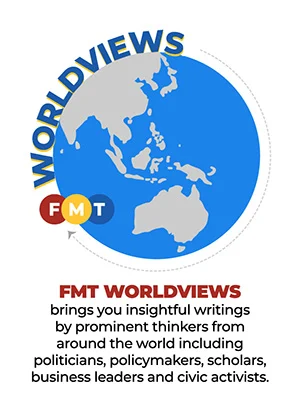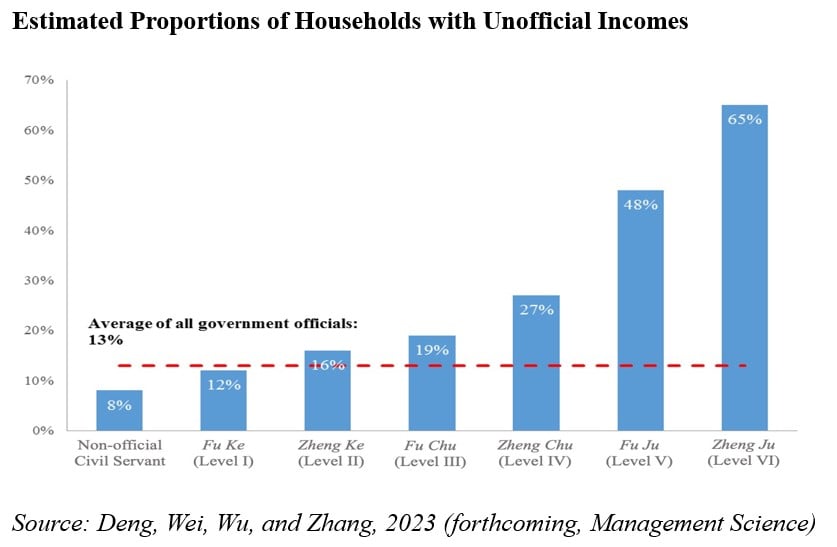
Bribery of public officials remains a major problem across the developing world and in some developed countries, too. Studies have repeatedly shown that graft impedes economic growth and development, prompting governments around the world to intensify their efforts to root out corruption.
China’s anti-corruption drive stands out in this regard, having led to the arrest or indictment of hundreds of high-ranking officials, as well as more than a million lower-level government representatives, since 2013.
Corruption increases the cost of doing business, impeding economic efficiency and undermining fairness across the economy and society. But, given that bribery typically occurs under the table, estimating the extent and scope of illicit earnings is extremely difficult. One way to do this is to apply the permanent income theory, which establishes a link between household wealth and big-ticket consumer purchases.
In a forthcoming paper in Management Science, we and our co-authors employ this methodology to estimate Chinese government officials’ “unofficial” income.
Analysing data on home purchases and incomes in a major Chinese city between 2006 and 2013, we compared households with a government official to those without one.
We then examined the relationship between the value of homes acquired and household wealth, accounting for factors like the official’s gender, age and education level.
We found that, on average, Chinese officials’ so-called “grey income” amounted to 83% of their formal salary. Notably, this figure increased sharply with rank. For example, the unofficial earnings of low-level civil servants were just 27% of their official income.
By contrast, for governmental division chiefs (zheng chu in Chinese administrative jargon), the ratio skyrocketed to 172%. Strikingly, the off-the-books income of a director-general in a government department (zheng ju) – on par with the mayor of a small or medium-sized city in China’s administrative hierarchy – represented a whopping 424% of official compensation.
In principle, there can be two different types of corruption equilibria: one in which a few highly corrupt officials operate within an otherwise clean bureaucracy, and another in which corruption is widespread across the administrative system. Each of these scenarios affects the economy and society in distinct ways, requiring different anti-corruption strategies.
To understand which of these scenarios applies to China, we estimated the proportion of officials at specific administrative levels likely to have unofficial earnings.
By comparing the value of home purchases in households with a government official to those without one, we found that 13% of the officials in our sample have an unofficial income.
Importantly, this ratio also increases with rank. For example, our data suggests that roughly 8% of civil servants who are not in managerial roles receive significant undisclosed earnings, compared to 12% of low-level officials, 27% of the zheng chu, and 65% of the zheng ju.

Some have argued that public officials resort to bribes because their wages are low compared to what they could have earned in the private sector. To evaluate this claim, we considered factors such as education, work experience, age, and gender.
Contrary to popular belief, we found no evidence that the government officials in our sample were underpaid given their education level and experience. In other words, inadequate government salaries are not the primary reason for the prevalence of bribery among Chinese bureaucrats.
The Chinese government’s sweeping anti-corruption campaign presents a unique opportunity to examine whether grey incomes stem from bribes. Our findings imply a significant correlation, as these unofficial earnings appear to decrease in areas where anti-corruption efforts have intensified, especially after the arrest or indictment of high-ranking local officials.
This suggests that the Chinese government’s anti-corruption measures have been at least somewhat effective. In addition to these efforts, introducing market-driven reforms, especially those that curtail government officials’ discretionary powers to issue licenses or allocate subsidies and other resources, could go a long way towards winning the fight against corruption. - FMT
 Yongheng Deng is professor and distinguished chair of Business, chair of the Department of Real Estate and Urban Land Economics, and director of the Global Real Estate Masters Program at the University of Wisconsin-Madison.
Yongheng Deng is professor and distinguished chair of Business, chair of the Department of Real Estate and Urban Land Economics, and director of the Global Real Estate Masters Program at the University of Wisconsin-Madison.
 Shang-Jin Wei, a former chief economist at the Asian Development Bank, is professor of Finance and Economics at Columbia Business School and Columbia University’s School of International and Public Affairs.
Shang-Jin Wei, a former chief economist at the Asian Development Bank, is professor of Finance and Economics at Columbia Business School and Columbia University’s School of International and Public Affairs.
The views expressed are those of the writers and do not necessarily reflect those of MMKtT.


No comments:
Post a Comment
Note: Only a member of this blog may post a comment.